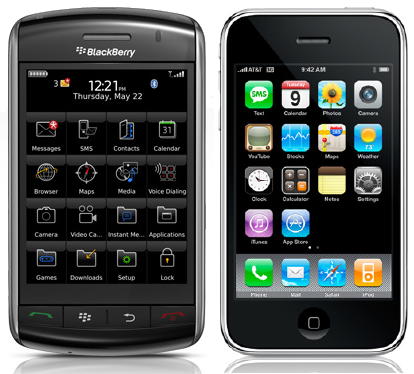 In a conference call earlier in the month, Steve Jobs said it first: Apple has overtaken RIM in the mobile phone market. Jobs now has the numbers to back his boasts up. According to an IDC report based on the year’s third quarter figures, Apple can now safely claim to be the world’s fourth largest mobile phone vendor. BlackBerry maker RIM now ranks fifth behind Apple. Rounding out the top five are companies LG Electronics, Samsung, and Nokia. Apple and RIM are the only two companies in the top five that exclusively sell smartphones. Sony Ericsson was bumped from the list for the first time since the IDC began tracking mobile phone sales in 2004.
In a conference call earlier in the month, Steve Jobs said it first: Apple has overtaken RIM in the mobile phone market. Jobs now has the numbers to back his boasts up. According to an IDC report based on the year’s third quarter figures, Apple can now safely claim to be the world’s fourth largest mobile phone vendor. BlackBerry maker RIM now ranks fifth behind Apple. Rounding out the top five are companies LG Electronics, Samsung, and Nokia. Apple and RIM are the only two companies in the top five that exclusively sell smartphones. Sony Ericsson was bumped from the list for the first time since the IDC began tracking mobile phone sales in 2004.
In terms of growth figures, Apple was dominant. The iPhone maker reported an increase of 90.5 percent in phone shipments from the third quarter of 2009. Apple’s surge was in large part due to the release of the iPhone 4, which sent the company’s overall iPhone sales soaring to over 14 million for the quarter. RIM had the second most highest growth numbers with just under a 50 percent increase in shipments.
Overall the worldwide mobile phone market grew by 14.6 percent, marking the fourth quarter in a row that’s seen double-digit growth. Total mobile phone shipments for the quarter reached 340.5 million units compared with 297.1 million a year ago.
The IDC report makes one thing clear: smartphones have a very large role to play in the future of the mobile phone industry. “The entrance of Apple to the top 5 vendor ranking underscores the increased importance of smartphones to the overall market. Moreover, the mobile phone makers that are delivering popular smartphone models are among the fastest growing firms,” said Kevin Restivo, senior research analyst with IDC. “Vendors that aren’t developing a strong portfolio of smartphones will be challenged to maintain and grow market share in the future.”
To that point, LG Electronics, the only company in the top five without a strong smartphone presence, was also the only company to see a decline in growth from the previous year with shipments dropping by just over 10 percent. The report predicts a 55 percent increase in smartphone growth for the year in the worldwide market.
Even with RIM in Apple’s rearview, it’s not at all likely that Steve Jobs will let his company coast. After all, there are three other companies still ahead of Apple and the iPhone is continuing to face challenges to its smartphone dominance from the rising popularity of Android, Google’s mobile phone operating system. Who knows? Maybe the next time we hear Mr. Jobs throwing verbal jabs at a rival, it could very well be Nokia that’s on the receiving end.
Editors' Recommendations
- How to find and use transcripts in Apple Podcasts
- Hands-on with the Belkin iPhone Mount with MagSafe for Apple TV 4K
- How to get a D-pad on your Apple TV Remote app
- The OnePlus 12 has one big advantage over Samsung and Apple
- How to reset your Apple password on iPhone or web


